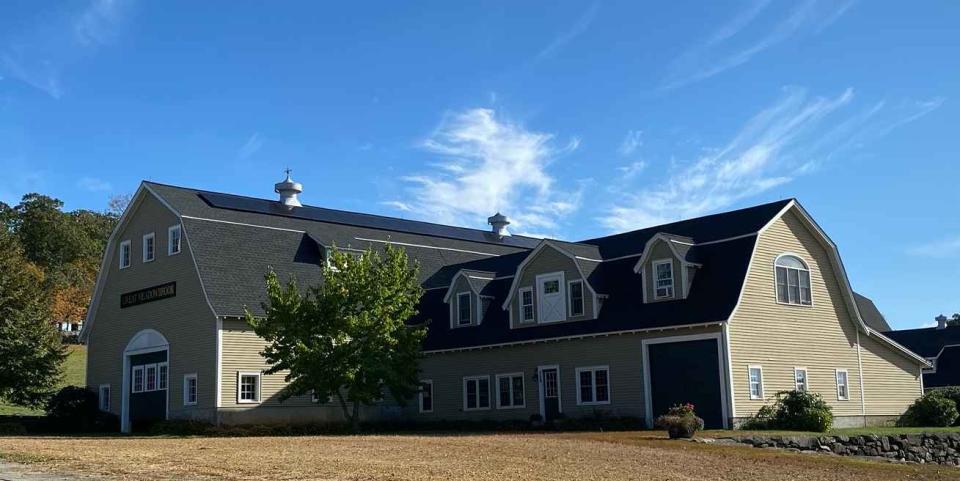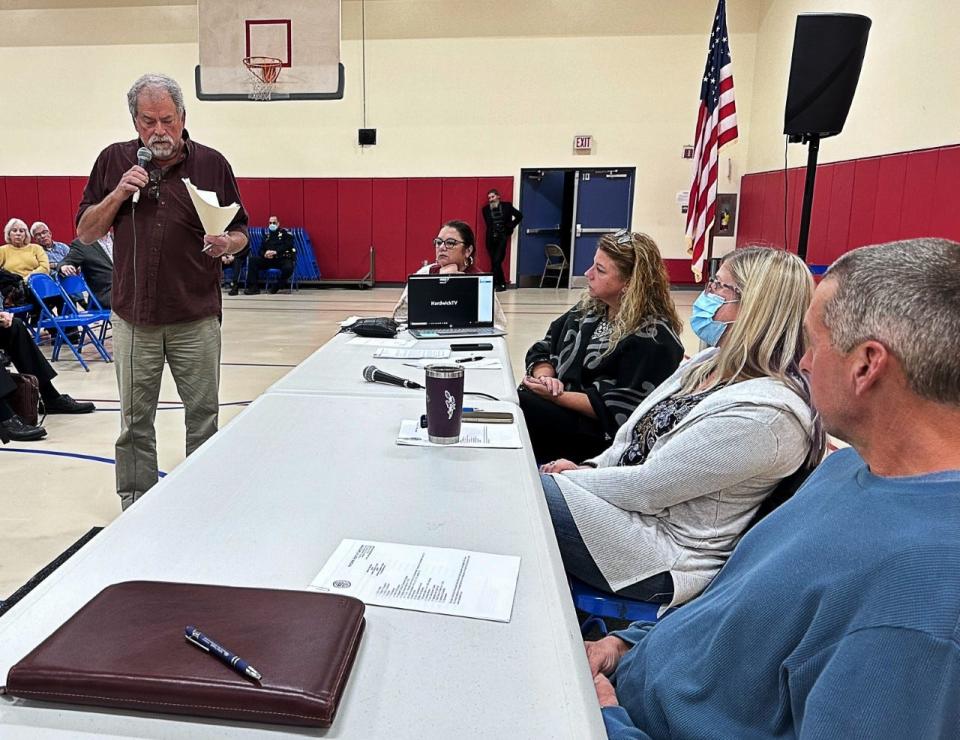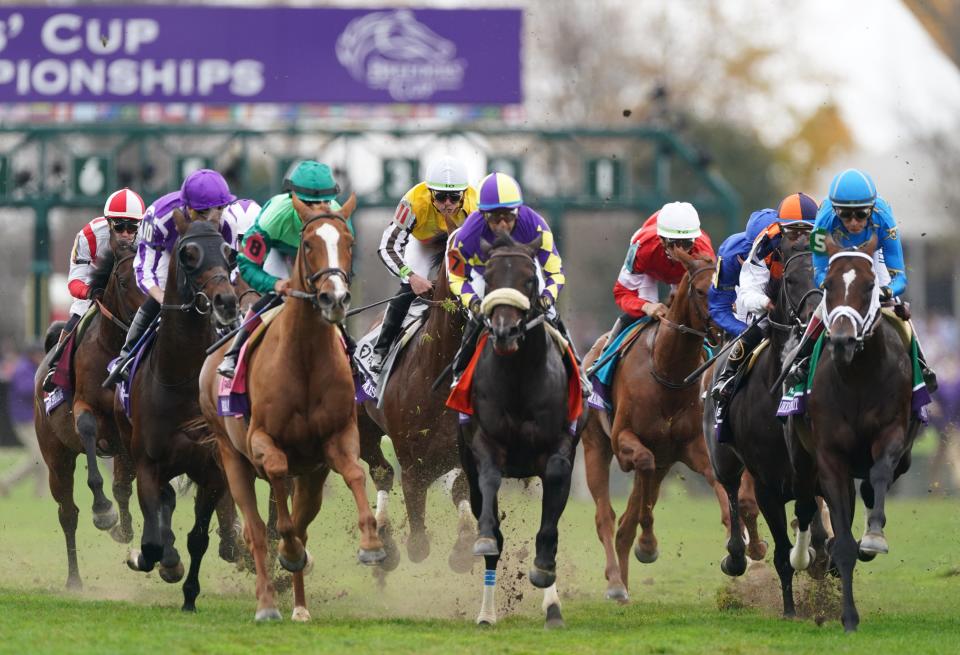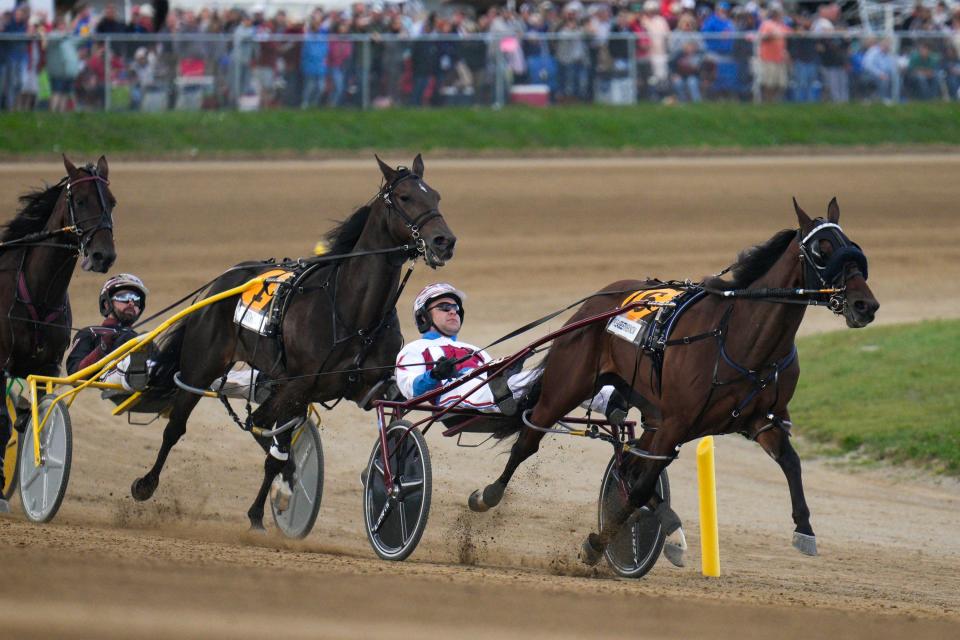Is horse racing in Massachusetts' future? Plymouth said no; now it's up to Hardwick residents to decide if they want it
Plymouth residents have already had their say about a proposal by a Boston developer to build a thoroughbred racetrack in their community.
Hardwick residents will get to decide on a thoroughbred racing proposal in their Central Massachusetts town in early January.
While both had the potential of bringing thoroughbred racing back to the state (Suffolk Downs closed in 2019), the proposals differ in scope and purpose.

The project that would have seen the construction of a racing oval on a 110-acre tract in Plymouth, the County Woodlot, would have been a $500 million investment in a mixed-use commercial development, marrying a racetrack, an entertainment venue and retail stores.
The Hardwick track would combine breeding, training and retraining/retirement endeavors with a track used sporadically to generate the funds needed to support the facility.
In the May referendum that posed the question to Plymouth voters, the response was a resounding no, with 88% of voters giving the proposal a thumbs-down.
Referendum vote Jan. 7
Hardwick residents will get their say Jan. 7. Residents will be able to cast their ballots in the referendum between noon and 7 p.m. at Hardwick Elementary School.
“The one thing I will say is that everybody in this town wants to vote on this,” Selectman H. Robert Ruggles has said.

The three-member board at first unanimously denied the application for the track proposed for the Meadowbrook Farm in October. But a petition with 400-plus signatures supporting the proposal prompted the board to reconsider its vote. In a second vote, two members, Ruggles and Julie Quink, voted for approval while Kelly Kemp affirmed her nay decision.
A second petition opposing the plan, with the signatures of 12% of the registered electorate, was then presented to the board, triggering the referendum after selectmen again voted in favor of the plan.
If residents vote to approve the track, developers would still need to present plans to the state Gaming Commission and the local Planning Board before a shovelful of dirt is moved.
Point of debate: Is horse racing ethical?
In the back and forth between residents, town officials and developers proposing to bring thoroughbred racing to two different communities in Massachusetts, some worry that the well-being of the horses can get lost.
“From a layperson’s estimate, a track doesn’t seem to be a bad neighbor,” said Alec Welan, a legal ethicist and professor of law at Rutgers University.

Welan speculated that residents of communities where tracks have been proposed may fear gambling issues, a crush of tourists and messes.
“It’s hard for a community to build the infrastructure needed to support an event that only happens a limited number of times a year,” he said.
In a piece published on Paulick Report, a thoroughbred racing website, Welan and Larry Smith, a breeder and owner based in Maryland, discussed the ethics of racing.
“We’re not exploiting the animals for economic benefit,” Smith said of his role as breeder and racer. “People misunderstand how much horses enjoy racing.”
He said horses that would prefer not to race will make that known to trainers by balking or failing to perform.
“Our overarching philosophy is that (the) healthier, happier and sounder a horse is, they work better for owners and trainers,” Smith said.
There have been issues, however.
A stint of horse deaths at Santa Anita Park in California from 2018 through this year enraged animal rights activists. The California Horse Racing Board found that 23 deaths (about 39%) of fatalities recorded from December 2018 through March 2019 were weather-related. The agency's report found injuries that resulted from a rigorous training schedule and track conditions.
“There’s a lot of science now to prevent that,” Smith said.
Protections for horses, Welan said, could be increased as a way to mitigate some of the negatives involved in horse racing.
“There are always problems when profit is mixed in,” he said.
The developers of the Hardwick track, Commonwealth Equine and Agricultural Center, include a former partner in Suffolk Downs, Richard Fields.
Breeding, training and racing
The proposal would see the 359-acre property developed as a horse breeding facility, as well as a retirement center for thoroughbreds that can no longer race. The oval would be in use for approximately 20 race days when fully developed, according to the proposal.
The consortium holds a purchase-and-sale agreement that expires in February.

Race days, which in the first year would take place just one weekend day, would be held to support the facility and the proposed retirement/retraining element of the farm's operation. People around the country would be able to bet on those races using online platforms or in person by visiting a betting kiosk set up on race days only.
The developers expect the venture would generate some $20 million in revenue, serve as an agritourism attraction and accommodate 5,000 spectators on race days.
One-and-a-half percent of the bets from all wagers made in person or online on Massachusetts-based races would be provided, by statute, to the host community. In Hardwick, that amount is estimated to be $240,000 a year.
The developers have also committed to giving the town $260,000, bringing the total revenue to Hardwick to at least $500,000 annually.
If denied, the property would revert to its current owner, restaurateur Weidong “Wilson” Wang, and could be developed as a marijuana farm. Wang’s group proposed a marijuana facility, Zen Acres, at the site, but that proposal was met with opposition from residents.
Wang purchased Great Meadowbrook Farm in 2021 from Erik Fleming and Torrance Watkins, an Olympic equestrian.
"The proposal developers understand and respect the desire to have this issue decided by referendum and look forward to continuing the public dialogue and answering questions and concerns," said former state Rep. John Stefanini, who is chairman of the developers' Racing Oversight Board.
The group has published a FAQ that it has distributed to households in town.
What happened in Plymouth
While Great Meadowbrook Farm has always focused on farming and agriculture, primarily horses, and sits in a rural area, the Plymouth tract is in a more densely populated area off Long Pond Road and would be adjacent to new housing construction.
The property, under a three-year contract to Boston South Real Estate & Development LLC, is currently used for walking and by enthusiasts who ride all-terrain vehicles. It is zoned for both industrial development and rural/residential use.
Racing at Plymouth was proposed as a summer event, with the track and stables used for exercising and stabling horses in the offseason. Local officials expressed its concern that gambling in general can result in high crime, prostitution and drug activity.
Last month, the Board of Selectmen memorialized the residents’ vote, sending written testimony to the Joint Committee on Consumer Protection and Professional Licensure that horse racing is prohibited in Plymouth. The board said the only way to reverse the decision would be through a referendum, with appropriate notice given for public hearings, all done within one calendar year.
The developers proposed the project when Plymouth County, which owns the land, asked for proposals for the property.
In a letter to the Plymouth Board of Selectmen, the developers said they would, “explore all development opportunities that would benefit the county and county residents while bringing long-term revenue and revenue streams to Plymouth.”
The board expressed worry that the developers had not abandoned the idea of a racetrack at the site and that they might take their case to the 27 communities in the county.
But board Chair Betty A. Cavacco said legislators had assured her that it would be almost impossible for the developers to proceed with horse racing after the town voters and the Board of Selectmen had voted against it.
This article originally appeared on Telegram & Gazette: Plymouth residents nix horse race proposal; Hardwick votes in January

